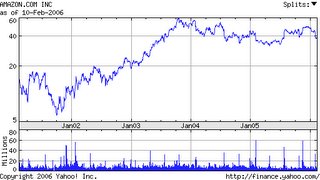What does "Amazon.com" mean to you? Does it mean " Internet book store"? Or does it mean "online shopping"?
Amazon.com started as a book store and built a very successful brand name. If you wanted to buy books online, chances are you went straight to Amazon. But then they decided to expand their business to include all kinds of merchandise.
What did branding gurus Al Ries and Laura Ries predict?

But I still associate Amazon with books, and I wonder what percentage of their revenue comes from book sales.
Amazon.com started as a book store and built a very successful brand name. If you wanted to buy books online, chances are you went straight to Amazon. But then they decided to expand their business to include all kinds of merchandise.
What did branding gurus Al Ries and Laura Ries predict?
"Amazon.com means Internet bookstore. Not auctions, gifts, home-improvement products, toys, video games, electronics, software, DVDs, or videotapes . . . . Line extension is very popular in corporate America, almost as popular as stock options and corporate jets. Both feed the corporate ego.Judging by a five year chart of Amazon's stock price, they haven't done too badly:
What is terribly confusing is the fact that line extension can work . . . in the short term. But almost never in the long term."

But I still associate Amazon with books, and I wonder what percentage of their revenue comes from book sales.
Comments